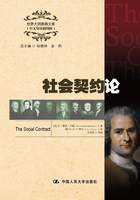
第六章 论社会公约
契约的观念早在古希腊古罗马时代已经产生,是作为商品交易过程的经济法律概念出现的。到了中世纪,契约沾染了宗教神学的色彩,在人与神之间确立。在罗马法、《圣经》和亚里士多德的《政治学》中都可以寻觅其踪。出现在近现代政治领域的社会契约概念,是经历了中世纪漫长的反对专制、文艺复兴运动的争取自由以及启蒙运动推崇理性的浪潮,建立在自然状态和人类理性的基础之上,其主要观点是处于“自然状态”下的人们,基于彼此间的合意,以契约的形式把原本属于自己的天赋权利让渡出来形成政治统治权力,从而进入国家状态,是一种“国家发生学说”。“在这一理论中,契约被用来证明政治权威的合法性,或用来对政治权威施加限制。”![[英]莱斯诺夫等著,刘训练等译:《社会契约论》,9页,南京,江苏人民出版社,2005。](https://epubservercos.yuewen.com/C39E9A/15653222605048206/epubprivate/OEBPS/Images/note.png?sign=1738998234-2ZRnE7IqX14HIHSIEygNWduVTluJ9SCX-0-510491dee886a863d8234e402876c856) 其最具代表性的人物有:霍布斯、洛克和卢梭。他们社会契约思想主要包括对人性、自然状态与社会状态、主权形式界限等的阐述。
其最具代表性的人物有:霍布斯、洛克和卢梭。他们社会契约思想主要包括对人性、自然状态与社会状态、主权形式界限等的阐述。
对霍布斯来说,人性天生自私残忍,自然状态就是战争状态,通过契约方式形成的国家利维坦,凭借权威能保证人民生活的安定、和平与稳定。他认为,任何能够保障其成员安全的政治权威都是合法的,人们的安全胜于自由,君主制的专断也比一种无政府的状态要好。在他看来,战争带给人们的灾难是最悲惨最糟糕的一种境遇了,人们通过选择,宁愿冒此风险,也不愿意再回到契约形成之前的自然状态中。
洛克承认,人的首要欲望是自我保存,但认为自然状态并不必然是战争状态,人们之所以舍弃自然状态的自由而加入社会和甘受社会约束,其根本目的是为了保护他们的生命、权利和财产,如果没有关于权利和财产的规定来保障他们的和平与安宁,人们根本不会加入社会。因此,政治权威合法性的标准是能否保障其成员的财产权利。但洛克继续论述,他认为政治社会中的人面临着更为可怕的危险,那就是暴政与专制,这种滥用权力引发的战争可能远比通常之自然状态下的战争糟糕得多,为此人民必须奋起反抗。于是,洛克的社会契约理论没有像霍布斯那样将人送入专制主的口中。
对于卢梭来说,人性起点是良善自由,理想契约要探寻的是一个不仅能保障人民的人身和财产,而且能维护和促进所有社会成员的幸福和美德的理想政治秩序。他为自己的社会契约设定的目标是“要寻找出一种结合的形式,使它能以全部共同的力量来保护每个结合者的人身和财富,并且由于这一结合而使得每一个与全体相联合的个人又只不过是服从其本人,并且仍然像以往一样自由”。这段话实际上包含了两个约定,即吉尔丁在《设计论证》中阐释的“低级约定”与“高级约定”,即“保护每个结合者的人身和利益”和“只不过是服从其本人,并且仍然像从前一样自由”。进一步说,这一契约可以表述为:“我们每个人都以其自身及其全部的力量共同置于公意的最高指导之下,并且作为一个整体,我们把每一个成员接纳为全体不可分割的一部分。”
三位主要代表人物的观点与其所处的社会历史背景有很大的关联。霍布斯由于身处动荡年代,对于安全的渴求要比其他一切都更为重要与可贵,认为人们最基本的的伦理需要是出于对“安全”的考虑。在他看来,只有在一个和平与稳定的社会局势下,人们才能真正做到自我保存,并最终实现人的生活幸福与社会和平,因此,人们自主选择订立契约,通过契约达成共识是人们希望过上安稳的生活,而只有国家的强力才能满足人们对“安全”的需求。洛克身处的时代,政局己趋于稳定,因此,他订立社会契约,与霍布斯为了自保、维护个人最基本的生命安全不同,他的社会契约论主要围绕“自由”这一伦理思想展开,希望借助“有限政府”的力量,保护人们获得最大限度的自由权。而卢梭认为,在人们一致同意的社会契约上建立起来的国家与社会,“并没有摧毁自然的平等,而是以道德与法律的平等代替自然所造成的人与人之间的身体上的不平等,所以,人们尽管在力量和才智上不平等,但是通过契约和权利,他们变得平等了”。显然,他的社会契约论是为了纠正人类在进入社会生活中的种种不平等与不公现象,所以,他的契约思想主要是为实现“平等”而提出的。
6. THE SOCIAL COMPACT
I SUPPOSE men to have reached the point at which the obstacles in the way of their preservation in the state of nature show their power of resistance to be greater than the resources at the disposal of each individual for his maintenance in that state. That primitive condition can then subsist no longer; and the human race would perish unless it changed its manner of existence.
But, as men cannot engender new forces, but only unite and direct existing ones, they have no other means of preserving themselves than the formation, by aggregation, of a sum of forces great enough to overcome the resistance. These they have to bring into play by means of a single motive power, and cause to act in concert.
This sum of forces can arise only where several persons come together: but, as the force and liberty of each man are the chief instruments of his self-preservation, how can he pledge them without harming his own interests, and neglecting the care he owes to himself? This difficulty, in its bearing on my present subject, may be stated in the following terms:
“The problem is to find a form of association which will defend and protect with the whole common force the person and goods of each associate, and in which each, while uniting himself with all, may still obey himself alone, and remain as free as before.” This is the fundamental problem of which the Social Contract provides the solution.
The clauses of this contract are so determined by the nature of the act that the slightest modification would make them vain and ineffective; so that, although they have perhaps never been formally set forth, they are everywhere the same and everywhere tacitly admitted and recognised, until, on the violation of the social compact, each regains his original rights and resumes his natural liberty, while losing the conventional liberty in favour of which he renounced it.
These clauses, properly understood, may be reduced to one—the total alienation of each associate, together with all his rights, to the whole community; for, in the first place, as each gives himself absolutely, the conditions are the same for all; and, this being so, no one has any interest in making them burdensome to others.
Moreover, the alienation being without reserve, the union is as perfect as it can be, and no associate has anything more to demand:for, if the individuals retained certain rights, as there would be no common superior to decide between them and the public, each, being on one point his own judge, would ask to be so on all; the state of nature would thus continue, and the association would necessarily become inoperative or tyrannical.
Finally, each man, in giving himself to all, gives himself to nobody; and as there is no associate over whom he does not acquire the same right as he yields others over himself, he gains an equivalent for everything he loses, and an increase of force for the preservation of what he has.
If then we discard from the social compact what is not of its essence, we shall find that it reduces itself to the following terms:
“Each of us puts his person and all his power in common under the supreme direction of the general will, and, in our corporate capacity, we receive each member as an indivisible part of the whole.”
At once, in place of the individual personality of each contracting party, this act of association creates a moral and collective body, composed of as many members as the assembly contains votes, and receiving from this act its unity, its common identity, its life and its will. This public person, so formed by the union of all other persons formerly took the name of city, and now takes that of Republic or body politic
and now takes that of Republic or body politic ;it is called by its members State when passive,Sovereign when active,and Power when compared with others like itself. Those who are associated in it take collectively the name of people,and severally are called citizens,as sharing in the sovereign power,and subjects,as being under the laws of the State. But these terms are often confused and taken one for another: it is enough to know how to distinguish them when they are being used with precision.
;it is called by its members State when passive,Sovereign when active,and Power when compared with others like itself. Those who are associated in it take collectively the name of people,and severally are called citizens,as sharing in the sovereign power,and subjects,as being under the laws of the State. But these terms are often confused and taken one for another: it is enough to know how to distinguish them when they are being used with precision.

迦太基遗址:在三次布匿战争中,迦太基人因无法舍弃作为地理意义和建筑意义上的城池,最终失去了作为国家政体和公民共同体意义上的城邦。